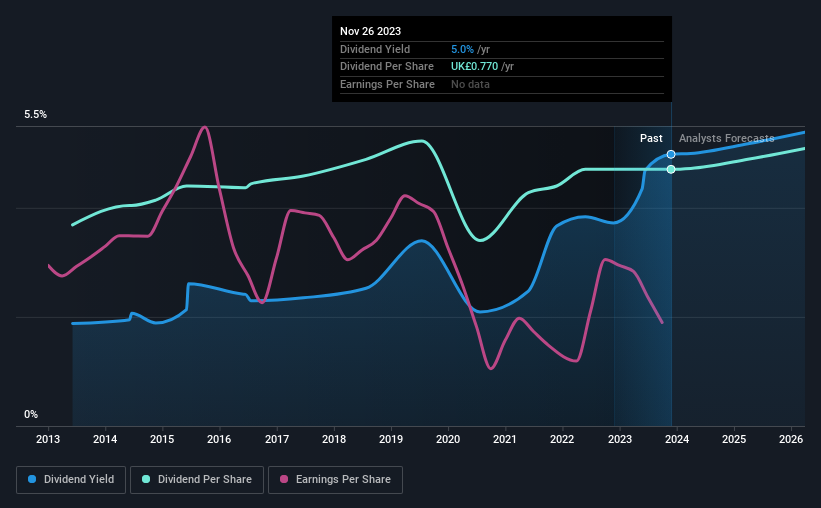- United Kingdom
- /
- Chemicals
- /
- LSE:JMAT
Don't Buy Johnson Matthey Plc (LON:JMAT) For Its Next Dividend Without Doing These Checks

Johnson Matthey Plc (LON:JMAT) is about to trade ex-dividend in the next 3 days. The ex-dividend date is usually set to be one business day before the record date which is the cut-off date on which you must be present on the company's books as a shareholder in order to receive the dividend. It is important to be aware of the ex-dividend date because any trade on the stock needs to have been settled on or before the record date. Accordingly, Johnson Matthey investors that purchase the stock on or after the 30th of November will not receive the dividend, which will be paid on the 6th of February.
The company's next dividend payment will be UK£0.22 per share, and in the last 12 months, the company paid a total of UK£0.77 per share. Last year's total dividend payments show that Johnson Matthey has a trailing yield of 5.0% on the current share price of £15.46. If you buy this business for its dividend, you should have an idea of whether Johnson Matthey's dividend is reliable and sustainable. We need to see whether the dividend is covered by earnings and if it's growing.
View our latest analysis for Johnson Matthey
Dividends are typically paid from company earnings. If a company pays more in dividends than it earned in profit, then the dividend could be unsustainable. It paid out 80% of its earnings as dividends last year, which is not unreasonable, but limits reinvestment in the business and leaves the dividend vulnerable to a business downturn. We'd be concerned if earnings began to decline. Yet cash flows are even more important than profits for assessing a dividend, so we need to see if the company generated enough cash to pay its distribution. It paid out an unsustainably high 316% of its free cash flow as dividends over the past 12 months, which is worrying. Our definition of free cash flow excludes cash generated from asset sales, so since Johnson Matthey is paying out such a high percentage of its cash flow, it might be worth seeing if it sold assets or had similar events that might have led to such a high dividend payment.
Johnson Matthey paid out less in dividends than it reported in profits, but unfortunately it didn't generate enough cash to cover the dividend. Were this to happen repeatedly, this would be a risk to Johnson Matthey's ability to maintain its dividend.
Click here to see the company's payout ratio, plus analyst estimates of its future dividends.

Have Earnings And Dividends Been Growing?
Companies with falling earnings are riskier for dividend shareholders. If business enters a downturn and the dividend is cut, the company could see its value fall precipitously. Johnson Matthey's earnings per share have fallen at approximately 9.0% a year over the previous five years. Ultimately, when earnings per share decline, the size of the pie from which dividends can be paid, shrinks.
Another key way to measure a company's dividend prospects is by measuring its historical rate of dividend growth. Johnson Matthey has delivered 2.5% dividend growth per year on average over the past 10 years. That's intriguing, but the combination of growing dividends despite declining earnings can typically only be achieved by paying out a larger percentage of profits. Johnson Matthey is already paying out 80% of its profits, and with shrinking earnings we think it's unlikely that this dividend will grow quickly in the future.
The Bottom Line
Is Johnson Matthey an attractive dividend stock, or better left on the shelf? Johnson Matthey had an average payout ratio, but its free cash flow was lower and earnings per share have been declining. It's not that we think Johnson Matthey is a bad company, but these characteristics don't generally lead to outstanding dividend performance.
With that being said, if you're still considering Johnson Matthey as an investment, you'll find it beneficial to know what risks this stock is facing. Case in point: We've spotted 4 warning signs for Johnson Matthey you should be aware of.
Generally, we wouldn't recommend just buying the first dividend stock you see. Here's a curated list of interesting stocks that are strong dividend payers.
New: Manage All Your Stock Portfolios in One Place
We've created the ultimate portfolio companion for stock investors, and it's free.
• Connect an unlimited number of Portfolios and see your total in one currency
• Be alerted to new Warning Signs or Risks via email or mobile
• Track the Fair Value of your stocks
Have feedback on this article? Concerned about the content? Get in touch with us directly. Alternatively, email editorial-team (at) simplywallst.com.
This article by Simply Wall St is general in nature. We provide commentary based on historical data and analyst forecasts only using an unbiased methodology and our articles are not intended to be financial advice. It does not constitute a recommendation to buy or sell any stock, and does not take account of your objectives, or your financial situation. We aim to bring you long-term focused analysis driven by fundamental data. Note that our analysis may not factor in the latest price-sensitive company announcements or qualitative material. Simply Wall St has no position in any stocks mentioned.
About LSE:JMAT
Johnson Matthey
Engages in the clean air, catalyst and hydrogen technology, and platinum group metals (PGM) service businesses in the United Kingdom, Germany, rest of Europe, the United States, rest of North America, China, rest of Asia, and internationally.
Undervalued with solid track record.
Similar Companies
Market Insights
Community Narratives



